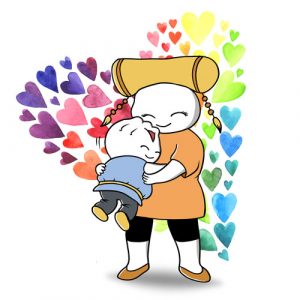Let’s start with a Chengyu about the great Chinese philosopher Mencius’s Mom.
1. 孟母三迁
mèng mǔ sān qiān
Literal Meaning: Mencius’ mother moved 3 times
Definition: The great efforts mothers make for their kids’ welfare
Story behind the Chengyu:
Mencius lost his father when he was little, and was brought up by his mother alone. When Mencius was a child, they lived near a cemetery, and Mencius started imitating the adults performing burial rituals. Mencius’s mother thought, “This is not the right place to raise a child.” So they moved to a place beside the market. This time, Mencius started mimicking the butchers and merchants in the market, pretending to yell and sell provisions. Seeing this, Mencius’s mother moved again, this time near a school, where Mencius started learning etiquette and courtesy, and eventually became the great scholar we now know. Here’s a video featuring the story of Mencius’ mother:
Check out this entry in our 成语 Cartoon Dictionary: 孟母三迁
When it comes to Chinese idioms for Mother’s Day, we have to find one that describes the care our moms give us.
2. 无微不至
wú wēi bú zhì
Literal Meaning: No detail too insignificant
Definition: To take care of every detail; in every possible way; meticulous
A related movie:
The Oscar-winning animated short film Bao talks about the meticulous care mothers give their children. Just like in the film, a mother’s care or worries can sometimes seem annoying or controlling, but let’s not forget that their starting point is always the love they have for us.
Check out this entry in our 成语 Cartoon Dictionary: 无微不至
As for moms (and let’s not forget they include grandmas!) with wonderful cooking skills, let’s praise their cooking with this chéngyǔ!
3. 出神入化
chū shén rù huà
Literal Meaning: Enter the realm of the spirit
Definition: To reach a divine state; a superb and wonderful achievement
Video:
Check out this cute video—in English!—of some Chinese grandmas trying each other’s dumplings!
Check out this entry in our 成语 Cartoon Dictionary: 出神入化
And to describe a mom full of wisdom and intelligence we can use…
4. 足智多谋
zú zhì duō móu
Literal Meaning: To be full of knowledge and have plenty of ideas
Definition: Resourceful; be wise and full of strategems
A related character:
A great model for this idiom is the heroine Huang Rong (黃蓉) from Jin Yong’s novel 射鵰英雄傳 The Legend of the Condor Heroes (often described as the Chinese world’s equivalent of The Lord of the Rings). She is a wife, a mother of three kids, but also the chief of the “Beggars’ Sect”. Check out this trailer for a 2017 tv adaptation of the novel! Huang Rong gets plenty of screen time demonstrating her wuxia/kungfu skills!
Check out this entry in our 成语 Cartoon Dictionary: 足智多谋
Finally, let’s thank our great moms and always remember to be grateful!
5. 饮水思源
yǐn shuǐ sī yuán
Literal Meaning: When you drink water, think of the source
Definition: To be grateful; to appreciate; to remember the person or organization who helped
Origin:
The Chengyu comes from one of the lines of the Chinese scholar Yu Xin’s (庾信) poetry. In the stanza, he wrote 「落其實者思其樹,飲其流者懷其源」which means “When eating fruits, think of the tree that nourishes it; and when drinking water, think of the source of the river.” Over time, the latter half of the stanza became abbreviated as 饮水思源, reminding ourselves to be grateful for those who have helped us along the way.
In the meantime, here’s a sweet (if button-pushing) Malaysian short film in Chinese from 2015 that really expresses 饮水思源!
Check out this entry in our 成语 Cartoon Dictionary: 饮水思源
Read and listen to a story showing 无微不至!
It’s our special bilingual Mother’s Day story “MAGIC MAMA 魔法妈妈”!
包子的妈妈总是把家人照顾地无微不至,导致她一出远门,家里就乱成一团。
Baozi’s mom is always so meticulous in her handling of family affairs, that when she goes on a trip, the home becomes a total mess! But just how does she do it?

